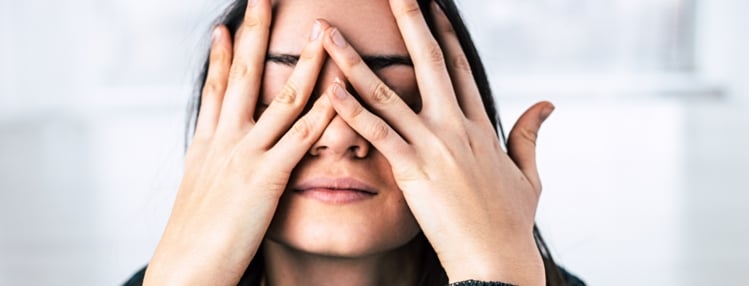The average menstrual cycle is 28 days long, although it’s normal for a menstrual cycle to be anywhere from 21 to 35 days, and this can vary by a few days each cycle without being considered late.
-
Tracking cycle
-
Getting pregnant
-
Pregnancy
-
Help Center
-
Flo for Partners
-
Anonymous Mode
-
Flo app reviews
-
Flo Premium New
-
Secret Chats New
-
Symptom Checker New
-
Your cycle
-
Health 360°
-
Getting pregnant
-
Pregnancy
-
Being a mom
-
LGBTQ+
-
Quizzes
-
Ovulation calculator
-
hCG calculator
-
Pregnancy test calculator
-
Menstrual cycle calculator
-
Period calculator
-
Implantation calculator
-
Pregnancy weeks to months calculator
-
Pregnancy due date calculator
-
IVF and FET due date calculator
-
Due date calculator by ultrasound
-
Medical Affairs
-
Science & Research
-
Pass It On Project New
-
Privacy Portal
-
Press Center
-
Flo Accuracy
-
Careers
-
Contact Us
How Long Can Stress Delay Your Period?


Every piece of content at Flo Health adheres to the highest editorial standards for language, style, and medical accuracy. To learn what we do to deliver the best health and lifestyle insights to you, check out our content review principles.
A general rule of thumb is that a period is considered late if it is delayed by five days or more.
Anyone who gets a period will probably experience a late period at least once in their life. It may come as a surprise that stress is actually a very common cause for a late period. If a period is delayed due to stress, how late it is depends on many factors, including the amount of stress, coping abilities, and the person’s individual cycle.
If the stress is acute, your period might only be a few days late, but some people who experience severe chronic stress can go months without getting a period.
Can stress delay your period?
Having a manageable amount of stress in your life is normal. But excessive levels of stress, whether physical or mental, can be detrimental to your health. One of the effects of stress is a spike in cortisol, sometimes called “the stress hormone.”
This is how it happens. Extreme physical, emotional, or nutritional stress activates a chain reaction in your body. It starts from changes in brain activity and activity in the brain endocrine glands, passes through the suprarenal gland where stress hormones — cortisol and adrenaline — are released into the blood, and disrupts the hormonal balance of the reproductive organs.
Take a quiz

Your mental health is important
Our built-in Health Assistant will help you understand your symptoms and look after your mental health.
What to do if stress delays your period
If you suspect that stress is the cause of your delayed period, there are several lifestyle changes you can make. Firstly, it is important to identify the possible causes of your stress and understand the level of stress you’re under.
Keeping a journal is one way to do this. Talking to a therapist is another. Meditation, yoga, and exercise are common methods that many people find helpful. In some cases, cognitive behavioral therapy (CBT) may be recommended.
A few ways to get your period back on track
Getting your period back on track might be possible by eliminating the unhealthy stressors in your life. If that’s not possible, learning and adopting new coping strategies might work.
If you have experienced delayed periods in the past, it can be quite helpful to track your moods, changes in diet, new medication, or big life events. This will help you better identify what some of your stressors are. The Flo app can help you with this.
Here are a few ways to reduce stress and get your period back on track:
Take a quiz
Find out what you can do with our Health Assistant
Make time to relax
The best way to reduce stress is to relax. Meditation, exercise, journaling, coloring books, art, and knitting are all ways to relax. Some, all, or even none of these may work for you, but figuring out what you enjoy for relaxation will make it easier for you to develop and follow through with a plan for relaxing when you are stressed out.

Cut back on caffeine and alcohol
Both alcohol and caffeine can increase cortisol levels, so it’s recommended that you reduce your intake of both of these when dealing with major life changes, going through a rough patch, or nearing your menstrual cycle. Instead, you might try decaffeinated beverages or herbal teas that are known to have calming effects, such as chamomile or lavender.
Prioritize healthy sleep
Getting better sleep is often one of the best ways to overcome stress. Often, we focus on the quantity of sleep, but quality is also important. Most people need about 7–9 hours of sleep to really refresh themselves. Sticking to a sleep schedule and routine can help improve your quality of sleep.
Avoiding screens for a few hours before you go to bed, wearing a sleep mask, and using a white noise machine can all make falling asleep and staying asleep easier. This will allow the body to fall into a proper sleep rhythm which can lower the chance of insomnia.

How to prevent stress from delaying your period
The first step in preventing stress from delaying your period is to understand what’s causing your stress and how much stress you can manage. You may not always be able to avoid stress, but you can develop healthy ways to cope with it. Tracking your cycle and any changes you experience in your moods will make it easier to identify any issues that may arise so you can better understand why your period is late.
While stress (physical, emotional, or nutritional) is a common cause for a late period, it is just one of many potential reasons for a delay in menstruation. Pregnancy, hormonal birth control, and health problems like polycystic ovary syndrome (PCOS) can also make your period late.
Sometimes the stress of worrying about a potential unintended pregnancy can make your period late. Taking a pregnancy test to find out if you are pregnant can reduce this stress. If your period is late, and you’re experiencing symptoms like unwanted hair growth, headaches, weight gain, and difficulty sleeping, you may want to see a health care provider to rule out PCOS, which is a treatable condition.
Tracking your mood, life events, and symptoms in an app like Flo can help you gain perspective on your level of stress, and taking simple measures like exercising or making time for meditation can help you get your period back on track.


Hey, I'm Anique
I started using Flo app to track my period and ovulation because we wanted to have a baby.


The Flo app helped me learn about my body and spot ovulation signs during our conception journey.


I vividly
remember the day
that we switched
Flo into
Pregnancy Mode — it was
such a special
moment.
Real stories, real results
Learn how the Flo app became an amazing cheerleader for us on our conception journey.
References
“Hypothalamic Amenorrhea.” UpToDate,
www.uptodate.com/contents/functional-hypothalamic-amenorrhea-pathophysiology-and-clinical-manifestations.
“Stopped or Missed Periods.” NHS Choices, NHS, Aug. 2019,
www.nhs.uk/conditions/stopped-or-missed-periods.
Robert L. Spencer, Ph.D., and Kent E. Hutchison, Ph.D. “Alcohol, Aging, and the Stress Response.” National Institute on Alcohol Abuse and Alcoholism (NIAAA), Vol. 23, No. 4, 1999,
https://pubs.niaaa.nih.gov/publications/arh23-4/272-283.pdf.
“Polycystic Ovary Syndrome (PCOS).” Mayo Clinic, Mayo Foundation for Medical Education and Research, 29 Aug. 2017, www.mayoclinic.org/diseases-conditions/pcos/symptoms-causes/syc-20353439.
Lovallo WR; Whitsett TL; al'Absi M; Sung BH; Vincent AS; Wilson MF; “Caffeine Stimulation of Cortisol Secretion across the Waking Hours in Relation to Caffeine Intake Levels.” Psychosomatic Medicine, U.S. National Library of Medicine,
https://pubmed.ncbi.nlm.nih.gov/16204431.




